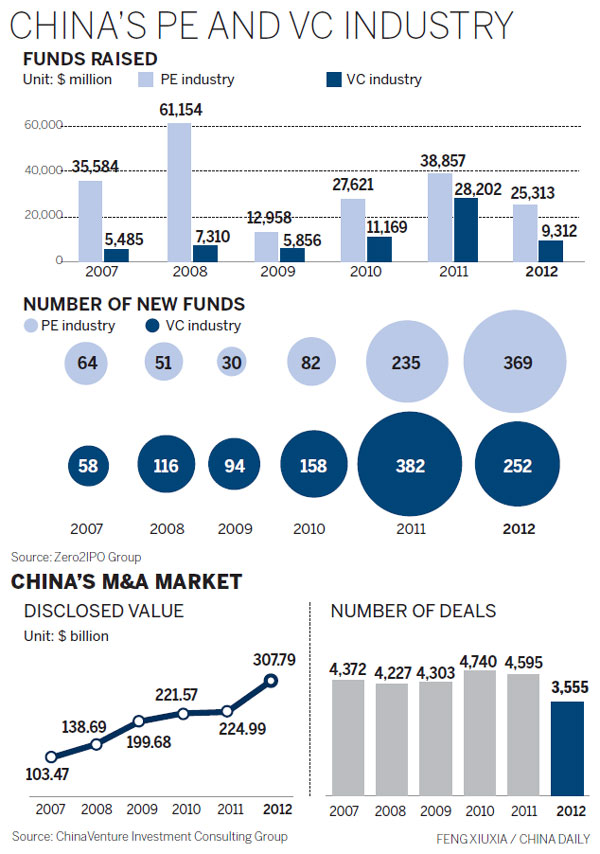Risk and Reward
Updated: 2013-01-18 08:38
By Hu Haiyan (China Daily)
|
||||||||
|
From left: Gavin Ni, founder and president of Zero2IPO Group; Richard Lumb, chief executive of Accenture's financial services group; Qiu Bochun, a lawyer at the US-based law firm Cooley. Photos Provided to China Daily |
Deal conundrum
Finding deals also poses challenges for the PE and VC players. As the number of established businesses for pre-IPOs is becoming fewer and competition in the PE industry intensifies, companies have started to look more at early and growth stage investment.
Wu Zhaoyang, president of Shanghai-based Leading Capital, says the grim market prospects have actually created more opportunities rather than problems for the industry. "It is a sign that the industry is becoming more mature," he says.
Wu says that despite the dull market conditions, Leading Capital raised more funds last year. Most of the PE firms were instead focused on companies in the early stages of development.
"The early and growth stage investment programs can help foster alternative investment exit channels like M&As, which will become more and more important," Wu said during the recent 12th China Venture Capital and Private Equity Annual Forum in Beijing.
"PE companies are focusing more on the invested companies' operations for the next three years and are also more choosy in investments. Most of the investment decisions are made after thorough scrutiny, and the entire process lasts for three to four months."
The absence of regulation is another major hurdle for the further development of the industry, say most experts. China's PE and VC funds have not been included in the latest draft amendment to the Law on Securities Investment Funds, and the industry will stay mostly unregulated, Wu Xiaoling, vice-chairman of the National People's Congress Financial and Economic Affairs Committee, said in her remarks at the 2012 China PE & VC Annual Conference.
She said the disagreements among the different regulators of PE and VC funds are the main reason for such a situation. But she believes that the PE and VC sector should come under the regulatory ambit, as it is part of the financial sector and investors' interests need to be protected.
The Law on Securities Investment Funds was put into effect in 2004 to help regulate the trade of public stocks, mutual funds and some bonds, but does not cover private equity funds. A second review of the amendment in October said the new regulations on privately offered funds would be imposed. The first review was in June.
But the latest amendments at the end of 2012 have again missed the wider industry.
According to Qiu, private equity and venture capital funds are generally unregulated, not just in China, but across the world. "The main reason is that those who invest in private equity and venture capital funds tend to be sophisticated investors who understand the inherent risks in such investments."
Qiu says typical investors of this kind are pension funds, sovereign funds and wealthy families who have invested in multiple PE or VC funds for several years.
"Government regulations are really not necessary for this sector as the players often tend to self-regulate. For example, the Institutional Limited Partners Association has been a prominent organization, which seeks to educate the players in this market and standardize legal terms and fund managers' reporting processes," Qiu says.
Domestic power
Jon Parker, PE partner at KPMG China, says despite these challenges, the growing domestic market is a strong backbone for further development of China's PE and VC industry. "There are many cities in China that are developing at a fast pace. This provides a lot of investment opportunities for PE and VC companiess."
Lumb from Accenture says that China has a very high concentration of wealth, and investors are struggling to find investment opportunities. "I'm sure that most of this wealth will make its way into the PE industry," he says.
Many PE and VC companies believe that despite the challenges, new opportunities are emerging, and these often outweigh the challenges. According to the 2013 China Private Equity Industry Outlook released by China Venture group, the Chinese PE and VC industry will witness slow and steady growth in 2013 as macroeconomic conditions become more favorable and IPO markets re-open.
Yan Xiaoping, a partner with CDH Venture, says: "There are several opportunities in the current market for VC and PE companies. If you plant the seeds in the winter, you can expect higher returns in spring and summer."
huhaiyan@chinadaily.com.cn

(China Daily 01/18/2013 page1)

 Li Na on Time cover, makes influential 100 list
Li Na on Time cover, makes influential 100 list
 FBI releases photos of 2 Boston bombings suspects
FBI releases photos of 2 Boston bombings suspects
 World's wackiest hairstyles
World's wackiest hairstyles
 Sandstorms strike Northwest China
Sandstorms strike Northwest China
 Never-seen photos of Madonna on display
Never-seen photos of Madonna on display
 H7N9 outbreak linked to waterfowl migration
H7N9 outbreak linked to waterfowl migration
 Dozens feared dead in Texas plant blast
Dozens feared dead in Texas plant blast
 Venezuelan court rules out manual votes counting
Venezuelan court rules out manual votes counting
Most Viewed
Editor's Picks

|

|

|

|

|

|
Today's Top News
Boston bombing suspect reported cornered on boat
7.0-magnitude quake hits Sichuan
Cross-talk artist helps to spread the word
'Green' awareness levels drop in Beijing
Palace Museum spruces up
First couple on Time's list of most influential
H7N9 flu transmission studied
Trading channels 'need to broaden'
US Weekly

|

|









